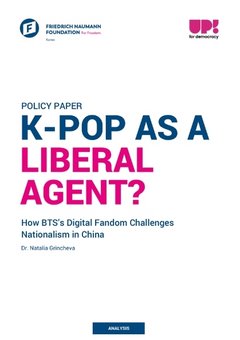Publication
BTS Fans Criticized Chinese Nationalism

Young fans have questioned authoritarian narratives and openly discussed issues like freedom of expression, according to a recent analysis by the Friedrich Naumann Foundation for Freedom.
The regime of the People's Republic of China massively censors social networks and pursues a nationalist cultural policy. However, in this restrictive environment, fans of the South Korean K-pop band BTS have initiated a digital counter-movement – some even openly criticize the government's stance.
This is the result of an analysis by Dr. Natalia Grincheva from LASALLE University of the Arts in Singapore. The study is part of the international and interdisciplinary research project "Mapping the Global Impacts of Hallyu – The Korean Wave," which is funded by the Korea Foundation and LASALLE University of the Arts Singapore. The project's goal is to analyze the global popularity and impact of South Korean pop culture (Hallyu).
For the Friedrich Naumann Foundation for Freedom, Dr. Grincheva examined how BTS fans in China challenge nationalist propaganda and how the band can spark debates on universal liberal values. BTS does not explicitly advocate for liberal values or criticize authoritarian structures in China – a criticism some have leveled against the band. However, according to Grincheva, the band has contributed to Chinese fans critically engaging with their own government or issues like freedom of speech.
Since 2016, China has massively restricted the influence of Korean culture. The trigger for these restrictions was South Korea's decision to install the U.S. missile defense system THAAD – a move that led to an unofficial ban on South Korean cultural goods. K-pop concerts were canceled or not approved, Korean TV series and films disappeared from Chinese streaming services, and South Korean stars were removed from advertisements or no longer invited to TV shows. Additionally, the Chinese government stoked nationalist narratives on social networks.
Grincheva’s study shows that China’s restrictive measures led to a counter-movement among many BTS fans. The study concludes the following:
- BTS Overcomes the Anti-Korea Movement in China: Despite strict censorship and the Anti-Hallyu campaign, BTS was able to maintain a strong presence in China. The Chinese fan base creatively circumvented existing restrictions, continued to support the group actively, and spread BTS's humanitarian messages.
- BTS Fans Challenge Chinese Nationalism: The polarization caused by nationalist discourses in China led to the formation of transnational communities among BTS fans. These communities challenge dominant nationalist narratives and show how digital fan cultures can influence cultural and political identities in repressive environments.
- BTS Appears Apolitical but Conveys Universal Values: By emphasizing empathy, self-respect, and human rights, BTS manages to bridge cultural and political divides. Their success demonstrates that it can be helpful to avoid politically charging an artist in order to effectively promote universal liberal values in sensitive contexts.
You can download the full study below.
